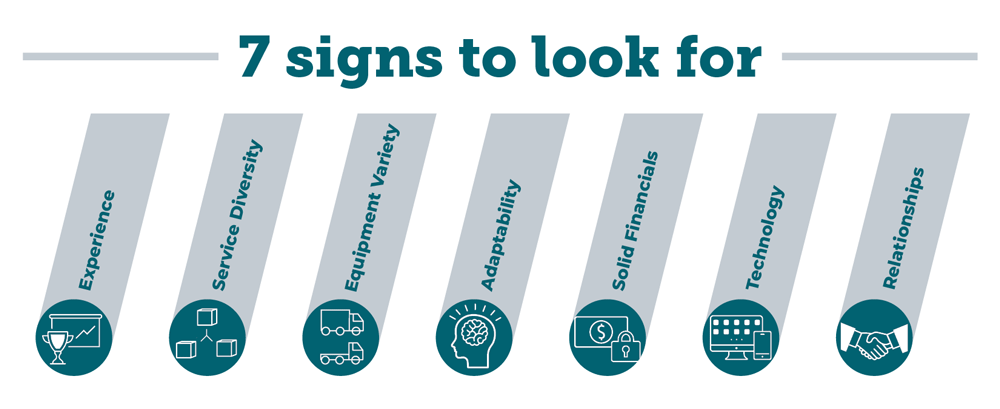The freight market can fluctuate almost as much as the weather in the Midwest (for those of you not from the Midwest, that means it can fluctuate a lot). And right now, we’re in the middle of one of the biggest supply chain disruptions we’ve ever experienced. So how do you know if you’re hiring a transportation provider that can withstand the ups and downs of the market? Here are seven signs to look for:

- Experience: Look for a company that’s been around a while. The longer they’ve been in business, the more “storms” they’ve weathered — meaning they’ll likely be able to take on the next supply chain disruption. A wave of new freight brokerages came into the market following the “freight bubble” of 2018. Today’s market disruption is the first one they have to maneuver through. Plus, their book of business likely isn’t as established as an experienced freight broker, so they don’t have a base of foundational customers to fall back on.
- Service Diversity: Companies that serve multiple markets are in a better position to survive, simply because they’re not relying on one industry to thrive.
- Equipment Variety: Much like serving multiple markets, having a variety of equipment can be a big sign of stability. Each market uses their own unique trailer type. Does your transportation provider have access to trailers that can serve multiple industries or freight types?
- Adaptability: How quickly your transportation provider can adjust to market fluctuations says a lot about their stability. In the case of COVID-19, can their Employees work from home? How are the Employees taken care of? Do those Employees take pride in the company they work for?
- Solid Financials: This one may seem obvious, but it’s about more than how far in the black they finish each year. Having a good financial footing allows for better decision-making because company leaders have a firm understanding of how a decision will impact their bottom line and have confidence in their standing to make decisions fast.
- Technology: The ability to invest in technology says a lot about your transportation provider. Do they invest in technology that makes your life easier — whether it’s an online Customer Portal and/or tracking technology? Do they have technology that allows them to make better, informed decisions? Good transportation providers will be able to use predictive data analysis to provide you better communication, high-quality carriers within their network and, ultimately, better pricing for you.
- Relationships: Relationships can go a long way in providing stability for carriers. If working with a freight brokerage, how solid are their relationships with their carrier network? Do they actually have firsthand knowledge about the carriers in their network and personal relationships with them or do they simply rely on load boards? Load boards serve their purpose, no doubt, but there’s nothing like knowing what type of freight each carrier in a broker’s network prefers to haul and who does what best. That means better, safer transportation of your freight. Also, how is your transportation provider’s relationship with you, their customer? Is it a transactional relationship where you only talk when freight needs to be moved? Good companies will stay in touch with you on a regular basis, whether or not you have an immediate transport need. That includes customer surveys. After all, it’s difficult to be a good partner if they don’t actually know what you want — so they can tailor their solutions to fit your unique needs.
All of this sounds great, right? But how do you determine if your carrier shows these signs of stability? The easy way is to ask. Of course, they don’t have to tell you the truth. One useful resource is their website. Read about their history, their leadership team (particularly their experience) and the markets they serve, among other things. Glean as much information as you can from there.
Financial strength can be the hardest to gauge, especially if it’s a privately owned company. But you can learn a lot by monitoring their practices. Are they expanding their fleet, hiring more Employees or even opening new offices and terminals? That’s generally a sign of financial strength. On the opposite end of the spectrum, downsizing can be a sign of financial strain.
Of course, this isn’t the be-all, end-all list of ways to determine a transportation provider’s stability. But hopefully it gives you a better understanding of what to look for when hiring a carrier. After all, if you find a stable carrier you can trust, you should only have to go through the hiring process once.




